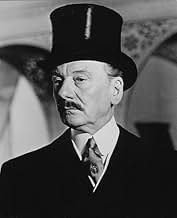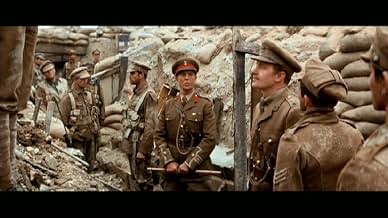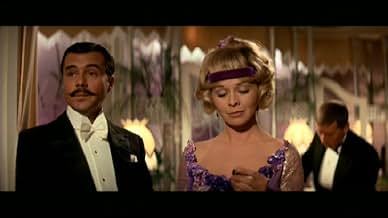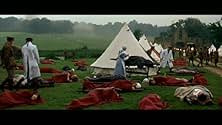Ajouter une intrigue dans votre langueThe working-class Smiths change their initially sunny views on World War I after the three boys of the family witness the harsh reality of trench warfare.The working-class Smiths change their initially sunny views on World War I after the three boys of the family witness the harsh reality of trench warfare.The working-class Smiths change their initially sunny views on World War I after the three boys of the family witness the harsh reality of trench warfare.
- Victoire aux 6 BAFTA Awards
- 8 victoires et 8 nominations au total
Histoire
Le saviez-vous
- AnecdotesThe song "La Chanson de Craonne" ("Adieu la Vie"), sung by Pia Colombo (Estaminet Singer) in this movie, commemorates a mutiny in 1917 by French troops. Merely singing it was considered an act of mutiny, and it was banned in France until 1974. During the war, a reward of one million francs and immediate honorable release from the Army was offered for the identity of the author, but never claimed.
- GaffesSir Edward Grey (Ralph Richardson) is shown early in the film being accompanied by his wife, described in the credits as Lady Pamela Grey. In fact, Grey did not marry Pamela (nee Wyndham, and the widow of Lord Glenconer) until 1922.
- Citations
Soldier Singer: It was Christmas Day in the cookhouse, the happiest time of the year, Men's hearts were full of gladness and their bellies full of beer, When up popped Private Shorthouse, his face as bold as brass, He said We don't want your Christmas pudding, you can stick it up your... tidings of co-omfort and joy, comfort and joy, o-oh ti-idings of co-omfort and joy. It was Christmas Day in the harem, the eunuchs were standing 'round, And hundreds of beautiful women were stretched out on the ground, Along came the big bad Sultan, and gazed on his marble halls, He said Whaddya want for Christmas boys, and the eunuchs answered... tidings of co-omfort and joy, comfort and joy, o-oh ti-idings of comfort and joy.
- Crédits fousOpening credits prologue: The principal statements made by the historical characters in this film are based on documentary evidence and the words of the songs are those sung by the troops during the First World War
- ConnexionsFeatured in Love Tory: A Film Portrait of Alan Clark (1993)
- Bandes originalesOh, It's a Lovely War
(uncredited)
Written by John Long and Maurice Scott
Performed by John Mills and chorus
Until I saw the movie, I didn't realize that there was some special music that accompanied WWI. It's music that now brings a tear whenever I hear it. The portrayal of pompous generals and their subservient minions, as they are posting the numbers of deaths and casualties for the day, is beautifully done. They were simply putting up numbers. But each number was often a death. A death of a promising young person. This movie makes war appear as brutal as it can really be. The poor always die first. It would be nice if international law demanded that the political and military leaders of a country be required to send their own children into war first. If that were the case, there would likely be no more war.
- arden_warner
- 26 juin 2004
- Permalien
Meilleurs choix
- How long is Oh! What a Lovely War?Alimenté par Alexa
Détails
- Date de sortie
- Pays d’origine
- Langues
- Aussi connu sous le nom de
- Oh! What a Lovely War
- Lieux de tournage
- Société de production
- Voir plus de crédits d'entreprise sur IMDbPro
Box-office
- Montant brut aux États-Unis et au Canada
- 801 591 $US
Contribuer à cette page

































